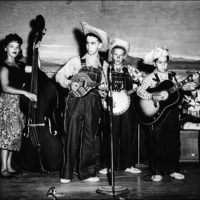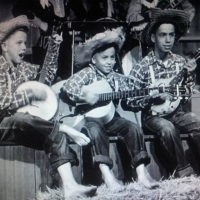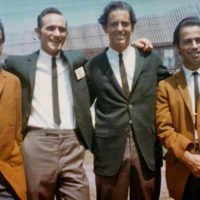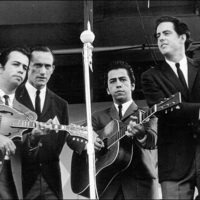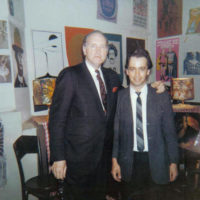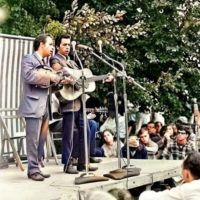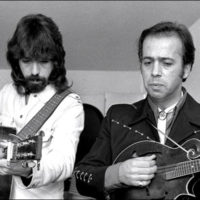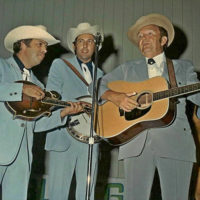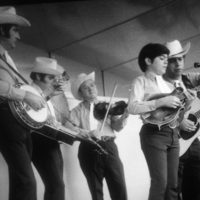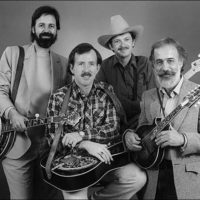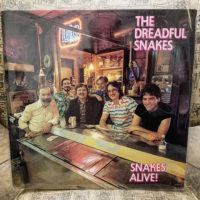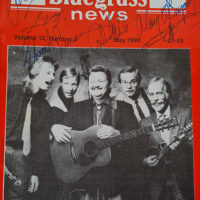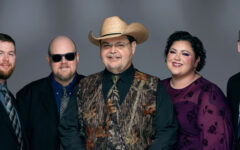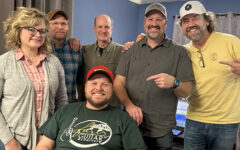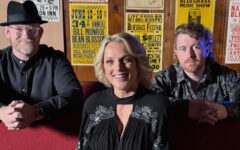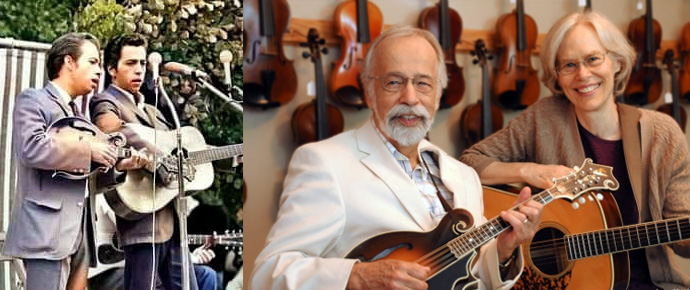
Roland and Clarence White/Roland White and Diane Bouska – photo by Nicole Christianson
Pioneer, multi-instrumentalist and singer Roland White, primarily a mandolin player with a career spanning over six decades, passed away on April 1, 2022, at Vanderbilt University Medical Center in Nashville, Tennessee following complications of a heart attack. He was 83 years old.
Of Acadian-French-Canadian ancestry, Roland Joseph LeBlanc (“the White” translated into English) was born in Madawaska, Maine, on April 23, 1938, growing up in a musical family. His father, Eric, Sr., played the guitar, tenor banjo, fiddle, and harmonica, while several uncles played guitar and piano.
At family gatherings, young Roland, the eldest sibling, and sister Joanne would join in the music making by singing. At the age of eight his father showed Roland his first chords on guitar, and two years he later got his first mandolin.
Along with his father, sister (bass), and brothers Eric (tenor banjo) and Clarence (guitar), they played in a country music ensemble simply called The White Family. One of White’s first public performances was at a local Grange Hall entertainment show in Chinalake, Maine. They did standard country numbers like Ragtime Annie, Golden Slippers, Rubber Dolly and Under The Double Eagle.
Shortly after he turned 16 In 1954, the White family relocated to Burbank, California, and the brothers formed a trio, the Three Little Country Boys.
Prompted by a comment made by his uncle Armand in the middle of 1955, Roland White began to investigate the music of Bill Monroe and bought a Monroe 45, A Mighty Pretty Waltz / Pike County Breakdown (Decca 9-28356). White recalls seeing Monroe sometime later on the TV show, Town Hall Party.
As he began to learn more about the music of Monroe, Flatt & Scruggs, Reno & Smiley, the Stanley Brothers, and Jimmy Martin, their act became more bluegrass orientated. White even learned to play Scruggs-style banjo.
Shortly thereafter (in October 1955), they learned of a talent contest called the Country Show, hosted by Carl “Squeakin’ Deacon” Moore, that took place every Sunday on radio station KXLA in Pasadena. In one show they won first place, leading to regular appearances on local radio – The Old Riverside Rancho Show included – and regional TV programs, such as Cal’s Corral, The County Barndance Jubilee, Hometown Jubilee, and Town Hall Party.
At the age of 19 Roland White went to Nashville where he met banjo player Billy Ray Lathum, who then moved to California from Cave City, Arkansas. In addition to Lathum they recruited southern Californian LeRoy ‘Mack’ McNees (dobro) to form a quintet that made its first recordings as The Country Boys; a 45-rpm single on the Sundown label pairing a cover version of Flatt & Scruggs’s I’m Head Over Heels in Love With You with a song, credited to a fellow Sundown artist Bill Lowe, called Kentucky Hills (SD 45-131).
Regularly, two nights every week, they appeared at the Frontier Club in Pomona, California.
Roland White, Eric White, Clarence White in a home video at a family picnic in Griffith Park, Los Angeles, California, April 1958
The Country Boys at ages 20 (Roland), 18 (Eric) and 14 (Clarence).
Until about 1959, they had little contact with any live bluegrass or acoustic music except through occasional concerts on Town Hall Party. The Ash Grove, a trendy Hollywood coffee house owned by Ed Pearl, was to be the scene of their introduction to many folk acts. Through the New Lost City Ramblers, they met Ed Pearl, manager of the club, who subsequently booked The Country Boys. At the time, Clarence and Eric were still in school and the others had day jobs.
A CBS cameraman saw a performance of the Country Boys at the Ash Grove and, impressed with what he heard and saw, forwarded his feedback to producers at the Andy Griffith Show (on NBC-TV). Shortly afterwards, the group received a call from Steve Stebbins of Americana Corporation (Woodland Hills, California), asking if they would be interested in appearing on the program.
As a result, in February 1961, The Country Boys appeared on the famous TV show. They featured in two episodes, Mayberry On Record (#19) and Quiet Sam (#29), although Roland was absent from the second due to army commitments.
Andy Griffith – Whoa Mule
February 13, 1961
The four songs they played on the show appeared later on an omnibus album with the title Songs, Themes & Laughs From The Andy Griffith Show, which was released on the Capitol label (Capitol ST-1611, 1962).
Around that same month The Country Boys recorded their second single, On The Mountain (Stands My Love) / The Valley Below, which was released by Republic (2013, April 1961).
In the summer of 1961 Eric White left the band to get married, whereupon the group invited Roger Bush to be the new bass player. This new combination teamed up with singer and guitarist Hal Poindexter for a single – Ain’t Gonna Worry ‘Bout Tomorrow / Carolina Sweetheart – for Hi-Lee Records (1804).
The Country Boys’ first real road work was a tour to Missouri, where a friend had found a job for them. However, it was cut short when Roland White was drafted to serve in the army, for which he did about two years in West Germany beginning about April 1961, and ending in in September 1963. In his absence The Country Boys cut a single and album, The New Sound Of Bluegrass America, for Paul Cohen’s Briar Records (M-109), released in the name of The Kentucky Colonels. White returned in time to participate in the making Appalachian Swing, the groundbreaking 12-tune instrumental LP that one reviewer proclaimed it to be, “one of the most influential albums in the whole of bluegrass music.”
Roland White & Jan Johansson – I am a Pilgrim (a workshop)
Marge Seeger and Ed Pearl booked an eastern tour for the band, starting in late 1963, during which they played such places as The Exodus in Denver; The Retort in Detroit; and Club 47 and The Broadside in Cambridge; The Ontario Place in Washington, DC; The Second Fret in Philadelphia; and the Unicorn Coffeehouse in Boston.
The Kentucky Colonels also appeared at Gerde’s Folk City in New York City for a week in November 1963.
In 1964 they made appearances at the Newport Folk Festival and clubs and coffeehouses across the country. On March 25, they appeared at the 2nd Annual UCLA Folk Festival in Los Angeles, and that same month Roland and Clarence White helped Tut Taylor cut an album of dobro instrumentals.
From July 23 to 26, 1964 the Kentucky Colonels appeared at the Newport Folk Festival in Rhode Island. Recordings from their performances there found there way onto a Vanguard album.
This is typical of their recording catalogue as, other than Appalachian Swing, they never did any studio sessions.
Their subsequent albums feature recordings from the Comedian Theater (on November 15, 1964); at the Ash Grove between March 27 and April 3, 1965; a Vancouver concert recorded January 15, 1965; again, at the Ash Grove (on March 27, 1965); at the Cobblestone Club in North Hollywood (in August 1965). These last two sets included the mercurial fiddler Scotty Stoneman.
Other locations where the Kentucky Colonels played during the two-year period 1964-1965 included clubs and coffeehouses across the country, including Gerde’s Folk City in New York and Club 47 in Cambridge, Massachusetts, as well as a return appearance at the Newport Folk Festival and frequent runs at the Ash Grove.
The Kentucky Colonels appeared as musicians in the movie The Farmer’s Other Daughter (1965), a bawdy comedy that included the song The Ballad Of Farmer Brown, sung by country music entertainer Ernest Ashworth and The Kentucky Colonels. A single featuring the song coupled with For Lovin’ Me was released in May 1965 (World Pacific 427). The band members were Roland White (mandolin), Clarence White (guitar), Billy Ray Lathum (banjo), and Roger Bush (bass). Richard Greene sat in on rhythm guitar along with an unidentified drummer.
Ernest Ashworth & Kentucky Colonels, The Farmer’s Other Daughter, etc.
As public taste turned toward rock ‘n’ Roll, The Kentucky Colonels disbanding briefly due to lack of work, doing their last performance on October 31, 1965.
By 1966, Clarence White, who had begun playing more electric guitar, left to do studio work, which eventually led to his joining the Byrds. Hence following the consequential dissolution of the Kentucky Colonels, Roland White played electric bass in several country music lounge bands in southern California to help make ends meet.
While on a California tour in May of 1967, Bill Monroe invited Clarence White to join the Blue Grass Boys, but he suggested that Monroe hire Roland to play guitar instead. The brothers were filling in at the Ash Grove as Monroe’s bus had broken down in Texas, leaving band members stranded there for a while. Roland joined the tour as a guest, and at the end of it was hired as the replacement for Doug Green, who was returning to college.
Roland White, speaking at the 2011 International Folk Festival in Nashville, Tennessee, relates how he went to work for Bill Monroe.
And during this period, he participated in three recording sessions with Monroe, cutting a total of nine tracks. Among the more memorable performances are The Gold Rush, Kentucky Mandolin, I Want To Go With You, on which White sings baritone, and the first recording of a haunting duet called The Walls of Time, with White singing lead. For this duet, in order to be level with Monroe, the diminutive White had to stand on a soft-drink box.
Five numbers were released on singles, although The Walls of Time remained unavailable until 1994. All recordings are included on the Bear Family 4-CD set Bill Monroe – Bluegrass 1959-1969.
Also, White was involved in the recording of Train 45 Heading South for a live radio / TV syndicated broadcast for National Life Grand Ole Opry, a performance subsequently made commercially available on a compilation by Opryland Home Video (JB 1914).
Bill Monroe (vocals and mandolin); Kenny Baker (fiddle); Vic Jordan (banjo); Roland White (guitar); and James Monroe (bass) – December 20, 1968
Life working for Monroe was far from being all-glamourous with regular appearances on the Grand Ole Opry and other big stages; White had to do a lot off-stage also. White once recalled how life was living off the bus, he was plunged into working at the somewhat chaotic environment of the Monroe’s first Bean Blossom festival – the Big Bluegrass Celebration in June 1967 – where he was still selling tickets and taking attendance money five minutes before he was due on stage, and he wasn’t properly dressed for the occasion. He helped to build the new 30-foot-wide stage and associated seating area out in the woods.
Bill Monroe & The Blue Grass Boys – Live – Bean Blossom, Indiana – 1967. 1st Annual Bean Blossom Bluegrass Festival, billed as a Big Bluegrass Celebration
Video could not be played
Bill Monroe, James Monroe, Roland White, Butch Robins and Byron Berline.
In the 1968 festival, although playing guitar for Monroe, White participated in the mandolin workshop alongside Monroe and Jesse McReynolds.
In September of that year White played mandolin on Kenny Baker’s second album.
White worked for Monroe for a little under two years, appearing around the country with performances at Carlton Haney’s third Labor Day weekend festival, Watermelon Park; across to Bill Grant’s festival in Oklahoma; in California; in Fort Worth, Texas; and at the DJ Convention in Nashville in the very early months, being indicative of the hectic life on the road with the Father of Bluegrass Music.
Starting in 1997 White organized the Bill Monroe Appreciation Nights which ran for about 20 years or so paying tribute to Bill Monroe’s music. They attracted appreciative audiences who enjoyed being entertained by the incredible talent that White was able to call upon.
Before White left the Blue Grass Boys they made a trip overseas to play at US military bases in Italy and Germany.
Shocked by the dissolution of Flatt’s partnership with Earl Scruggs, White became an original member of Lester Flatt’s Nashville Grass, allowing him to return to his more accustomed role as a mandolin picker.
After some rehearsals, the new band taped a variety of radio and TV shows, including programs for Martha White. They then hit the road with bookings in New Jersey, Ohio, Massachusetts, Connecticut, New York, West Virginia, Virginia, and Pennsylvania. The Nashville Grass even played up in Ontario, Canada, while out east.
In September 1969 White participated in the first of about 20 different recording sessions that produced a little less than 100 songs and tunes altogether.
These were distributed among several albums including Flatt Out, The One And Only Lester Flatt, Flatt on Victor, Kentucky Ridgerunner, On The South Bound, Foggy Mountain Breakdown, and Lester Flatt – Country Boy.
Additionally, White contributed to three memorable albums, namely Lester ‘n’ Mac, On the South Bound, and Over the Hills to the Poorhouse, that Lester Flatt did with his old singing partner Mac Wiseman.
Lester Flatt: Little Cabin Home
Live 1971 Renfro Valley, Kentucky; Lester Flatt and the Nashville Grass
Roland White solo I’m Just A Used To Be
Live 1973 Renfro Valley; Lester Flatt and the Nashville Grass
White left the Nashville Grass towards the end of January 1973, after doing his last recordings with Flatt.
He reunited with his brothers, Clarence and Eric, but the grouping, known as the New Kentucky Colonels (with Herb Pedersen and Alan Munde), was tragically cut short when Clarence was killed by a drunk driver. However, replacing The Dillards at short notice, they did make one overseas tour in the spring, and returned to the States for appearances on the east and west coasts.
There are two LPs documenting their time in Europe; The New Kentucky Colonels Live in Holland and The White Brothers: Live in Sweden, recorded at the Mosebacke club, Stockholm, Sweden on May 28 and 29.
One of their gigs – on May 11, 1973 – in Breda, The Netherlands was broadcast live on VPRO’s Friday-evening radio show
That same year, Roland joined Country Gazette, the popular Los Angeles-based band that also included former Blue Grass Boy, Byron Berline. White joined the band as a guitarist but later reverted to mandolin. Other members at the time included banjoist Alan Munde, and bass player Roger Bush.
The group’s blending of bluegrass and country-rock did much to foster the progressive movement in bluegrass in the United States and secured a loyal following for the group in Europe.
In the fall of 1978 the new Country Gazette line-up recorded their first album All This And Money Too? (Ridge Runner 0017)
He played mandolin on the recordings for eight albums with Country Gazette before leaving in 1988. These include Country Gazette Live, Out to Lunch, What a Way to Make a Living, All This and Money Too?, American And Clean, America’s Bluegrass Band, Bluegrass Tonight!, and Strictly Instrumental.
While working with Country Gazette, White released his first solo record, I Wasn’t Born to Rock ‘n’ Roll. With backing by members of the band, the album featured a mixture of traditional and contemporary material. Included were two songs by former employers Bill Monroe (Can’t You Hear Me Calling) and Lester Flatt (If I Should Wander Back Tonight).
When in the summer of 1979 singer-songwriter Jim Lauderdale made a pilgrimage to Nashville from North Carolina he had two goals; to work with and befriend Roland White and George Jones. White became a mentor to the 22-year-old Lauderdale, and realizing that he had talent, he arranged to cut an album with Lauderdale. The recordings took place in Earl Scruggs’ basement studio with a band that included Marty Stuart on guitar, Gene Wooten on dobro, and Johnny Warren on fiddle. Lauderdale couldn’t find a label to release the Roland White-produced album, and until 2017 the tapes were thought to have been lost. Jim Lauderdale and Roland White finally saw the light of day on August 3, 2018.
Country Gazette – Saro Jane [on the TV program New Country]
White moved a little closer to traditional bluegrass music when in early 1982 he teamed up with luminaries Béla Fleck, Blaine Sprouse, Pat Enright, Mark Hembree, and Jerry Douglas to form a fun band known as the Dreadful Snakes. Taking their name from the title of the early 1950s Bill Monroe song The Little Girl and the Dreadful Snake, their inaugural gig was at J.T. Gray’s Station Inn.
After Fleck sent a tape of the show to Ken Irwin (Rounder Records) the group cut their only album, Snakes Alive, at the Studio By The Pond, Hendersonville, Tennessee. It was regarded as one of the highpoints of recorded bluegrass during the 1980s.
During all this period White remained an active member of Country Gazette.
White made his debut with The Nashville Bluegrass Band, a group that had been in existence since 1984, when he joined them on stage at Nashville’s Station Inn on February 3, 1989. His first official gig was at the SPBGMA Convention later that month. During his tenure with them, he appeared on five albums. All received Grammy nominations and two – Waitin’ for the Hard Times to Go and Unleashed – earned awards in the Best Bluegrass Album category. While with The Nashville Bluegrass Band, White recorded his second solo album, Trying To Get To You.
They appeared regularly on The Nashville Network, were frequent guests on the Grand Ole Opry, performed at the prestigious Carnegie Hall, and toured as far afield as Europe, Brazil, and China.
Rooted in tradition, The Nashville Bluegrass Band still had an eye on then-current trends.
Never one to allow misfortune to trouble him unduly, when White broke a leg in mid-December 1994, he returned for the New Year’s Eve show and for over two months he played sitting down.
Long Time Gone / New Born Soul (The Blind Boys of Alabama) – The Nashville Bluegrass Band on the Grand Ole Opry ….
In 1994 he released another solo project, Trying To Get To You (Sugar Hill), recorded at Rich Adler’s Suite 2000, Belleview, Nashville. Instrumentally, it included Stuart Duncan and Gene Libbea of The Nashville Bluegrass Band; David Grier, Richard Bailey (who worked with White later), and Gene Wooten. Roland’s wife Diane Bouska, Alan O’Bryant, and Pat Enright all contributed vocally.
Nashville Bluegrass Band, Graves Mountain, 1995
Trying To Get To You foretold the transition to his own group, which happened after about ten years with the Nashville Bluegrass Band. As another example of this forthcoming change, Roland White and Diane Bouska were international guest artists at the Harrietville National Bluegrass and Traditional Country Music Convention in Victoria, Australia, in 1997.
The newly formed Roland White Band consisted of Bouska (vocal and guitar), Richard Bailey (banjo) and Todd Cook (bass). Jon Weisberger (vocal and bass] and Brian Christianson [vocal and fiddle) joined later.
The band’s debut recording, Jelly On My Tofu, in 2002, received a Grammy nomination for Best Bluegrass Album.
New River Train – Roland White Band live at McCabe’s Guitar Shop in Santa Monica, California; May-11, 2013
Roland White (mandolin); Diane Bouska (guitar); Herb Pedersen (banjo); Bill Bryson (bass) and Blaine Sprouse (fiddle)
Straight-Ahead Bluegrass is simply that, giving White the opportunity to share some of his “traditional bluegrass favorites” with his regular Roland White Band members. As Weisberger relates in his liner notes, “whether new or old, each [song] is filled with the lifetime of experience—and the vitality and the good humor—that Roland White brings every time he puts pick to strings and steps before a microphone to sing.”
In 2018 White recruited several of bluegrass music’s most exciting young musicians alongside some with more experience; Brooke and Darin Aldridge, Kristin Scott Benson (The Grascals), Aaron Bibelhauser, Russ Carson (Ricky Skaggs & Kentucky Thunder), Jeremy Darrow, Nick Dauphinais, Gina Furtado, Jeremy Garrett (The Infamous Stringdusters), David Grier, Brittany Haas (Hawktail), Josh Haddix, Justin Hiltner, Lindsay Lou, Kimber Ludiker (Della Mae), Drew Matulich, Patrick McAvinue, Darren Nicholson, Lyndsay Pruett, Jon Stickley, Billy Strings, Molly Tuttle, and Jon Weisberger, to record Roland White and Friends, A Tribute to the Kentucky Colonels.
The CD, which includes updated versions of twelve songs and tunes that were recorded or performed by the Kentucky Colonels in the 1960s and 1970s, recaptured “the spirit of the past and brings it to the present, transforming the music into modern-day classics,” according to one commentator.
As one would expect, White’s mandolin playing, and singing are solid and entertaining throughout.
He was ubiquitous at the Station Inn, either watching other people’s shows or putting on events of his own. When the Roland White Band played there, he would invariably spot younger musicians in the audience and get them up to play with the band.
A musician’s musician, White had his own unique highly rhythmic lead and back up mandolin styles, with a fluid, delicate touch to his playing, incorporating some of the musical intensity that he picked up from being around the likes of brother Clarence and fiddlers Scotty Stoneman and Paul Warren. He adapted his style to suit the sound of the band with which he was playing.
He admitted to playing things that he heard from other instruments, “I always liked Ralph Mooney’s pedal steel when he played with Wynn Stewart. I liked dobro and listened a lot to Josh Graves.”
White had a rich, clear baritone voice. Others have described his singing as “a bit laid-back” and “warm and poignant.”
He was a devoted and in-demand teacher and taught at a host of mandolin camps and workshops, and gave many private lessons. With Diane Bouska he has co-authored a number of instruction books including Roland White’s Approach to Bluegrass Mandolin, The Essential Clarence White – Bluegrass Guitar Leads, Roland White’s Mandolin Christmas and Roland White’s Christmas Chord Book. CDs accompany three of these.
It Came Upon A Midnight Clear – Roland White mandolin Christmas music
He can be heard on the soundtrack to the film, Dead Man Walking (1995), for which he, playing mandolin and adding a vocal part, and other members of The Nashville Bluegrass Band, backed Johnny Cash on the song, In Your Mind.
As well as the glittering array of bluegrass musicians who were his fellow band members, he shared the stage with other top names, including Sonny and Bobby Osborne; the Fairfield Four; Doc Watson; Tony Trischka; Darol Anger; Jesse McReynolds; The Del McCoury Band; Carl Jackson; Kathy Chiavola; and Missy Raines.
Tony Trischka Band with Roland White July 28, 2006
Planet Bluegrass, RockyGrass, Lyons, Colorado
Nevertheless, White yearned to play with his brothers most of all.
As well being a mentor to Lauderdale and Marty Stuart, White encouraged the likes of Casey Campbell, Tyler Andal, Luke Munday, Merideth Goins, Justin Hiltner, and Vickie Vaughn.
Stuart told Penny Parson in an interview about striking up a conversation with White (when with the Nashville Grass), “he was really kind to me, let me play his mandolin, took time to show me some things.” At the end of the following summer [Roland] “gave me his phone number” and [said], “If you ever want to come up, hang out, ride the bus, let me know. I’ll ask Lester, and you ask your mum and dad.” On his return to school which Stuart hated, he was one day dismissed … he called White, “He invited me up, Labor Day weekend, 1972. We went up to Delaware.”
(From Foggy Mountain Troubadour, The Life and Music of Curly Seckler, by Penny Parsons (University of Illinois Press, 2016). Used by permission.)
White was a humble, reserved man. There are many stories of his overwhelming generosity (to which I can personally attest), inviting Nashville visitors and newcomers to his house where his home-made salsa was a speciality.
Claire Lynch shared her memories of Roland’s kindness to her.
“Roland and Diane contacted me to ask if I could use some furniture for my new empty apartment. I thought I was destined to sleep on the floor, honestly. But they opened their storage unit to me and gave me a queen mattress, box springs and frame. I was SO GRATEFUL! And I felt so cared for.
Kindness and generosity marked Roland’s life.”
British banjo player Kenny Baker, of the Radio Cowboys and the New Essex Bluegrass Band), after attending the IBMA WoB convention at Owensboro in September 1994, visited Nashville. He reflects ….
“…..so many people are mourning the loss of Roland White. He was a friend to all he met – a sweet man.
The night before we flew back to England after three amazing weeks in the USA, during which I saw Roland a lot – he invited us to have dinner at his home. I and my friends, John Holder and Gaye Lockwood, along with Jim Rooney were there, and Ben Surratt and Missy Raines were too. It was a wonderful evening of lovely food and music.
Thank you, Diane and Roland, for your great kindness.”
Fiddler Blaine Sprouse was also close with White.
“Roland was a dear, dear friend. A gentle and generous man who made all of the people he met feel comfortable and like they belonged. He was one of my oldest and dearest friends and one of the first friends I met when I moved to Nashville in 1974. I feel honored and privileged to have played music with him and to call him friend. His impact on bluegrass music is immeasurable.
My heart goes out to his wife, Diane Bouska, and all of his family, friends, and fans.”
White was recognized for his considerable contributions to bluegrass music by the Society for the Preservation of Bluegrass Music (SPBGMA) which added his name to the Preservation Hall of Greats in 2010; and by the International Bluegrass Music Association (IBMA) with a Distinguished Achievement Award (2011), and induction into the Hall of Fame in 2017.
R.I.P. Roland White
Footnote:
Bob Black’s book, Mandolin Man: The Bluegrass Life of Roland White is scheduled for publication on June 7, 2022.
A Discography
Roland White / Roland White Band –
- I Wasn’t Born To Rock ‘N’ Roll (Ridge Runner RRR0005, 1976) [reissued in 2010 on Tomkins Square TSQ 2400 with bonus track; She Is Her Own Special Baby]
- Trying To Get To You (Sugar Hill SH-CD 3826, August 15, 1994)
- Jelly On My Tofu (Copper Creek CCCD-0211, 2002) – Roland White Band
- Straight-Ahead Bluegrass (Roland White Music RW 002, May 8, 2014) – Roland White Band
- A Tribute to the Kentucky Colonels: Roland White And Friends (Mountain Home MH 17242, October 26, 2018)
Kentucky Colonels
- Appalachian Swing! (World Pacific WP 1821, April 4, 1964) [reissued on United Artists [UK] UAS 29514 – Kentucky Colonels, featuring Roland and Clarence White, 1973; with bonus single tracks That’s What You Get For Loving Me and The Ballad Of Farmer Brown.][Kentucky Colonels (United Artists Records Bluegrass Best Collection [Japan] GXC 2013, 1978) contains the same recordings as UAS 29514.] [Liberty LN 10185 Appalachian Swing (contains 10 tracks only), 1982] [remastered and re-issued as Kentucky Colonels Featuring Roland & Clarence White, with Billy Ray Latham Roger Bush, Bobby Slone and Leroy Mack (BGO Records BGOCD357 (UK), 1997)] [also re-issued as Appalachian Swing! on EMI Music Special Markets / S&P Records SPR-717, 2005; with three recordings, Pickin’ Flat, A Fool Such As I and Black Ridge Ramble from Tut Taylor – Dobro Country.]
- Livin’ In The Past – Legendary Live Recordings [1961-1965] Briar SBR-4202, 1975 (also on Takoma/Briar BT 7202, in Japan on Trio PA 8107) [re-issued as Livin’ In The Past – Legendary Live Recordings (Rural Rhythm RHY 1020, September 23, 2003)]
- The Kentucky Colonels 1965-1967, Featuring Roland and Clarence White (Rounder 0070, 1976) [reissued in Spain on Guimbarda GS 11070 in 1979] [compiled from privately recorded live sessions]
- The Kentucky Colonels With Scotty Stoneman: Live in LA, (Sierra Briar SBR 4206, 1965 :– 78 Scotty
- The Kentucky Colonels 1966 (Shiloh SLP 4084, 1978)
- Kentucky Colonels, Featuring Clarence White (Rounder 0098, 1980)
- On Stage: Long Journey Home: Vanguard VCD-77004, November 1991) Hollywood 167003 Livin’ In The Past – Legendary Live Recordings, 1993 [re-issued on Sierra SXCD 6017 in 1996, see also Rural Rhythm RHY 1020, January 2003]
- Billy Ray Lathum Presents The Kentucky Colonels – Live In Stereo (Double Barrel Records DBL/BRL 1001, 1999) [re-issued by (FGM) May 27, 2003] – this contains material from a Vancouver concert recorded January 15, 1965.
The New Kentucky Colonels
- The White Brothers: Live in Sweden, 1973 (Rounder Records 0073, 1976) [re-issued as Live in Sweden, 1973 (Roland White Music, November 18, 2016)
- Live in Holland, 1973 (Roland White Music CD 1, 2013)
Lester Flatt / Lester Flatt and Mac Wiseman
- Flatt Out (Columbia CS-1006, April 1970)
- The One And Only Lester Flatt (Nugget NRLP-104, 1970 [Reissued on Power Pak PO-293 Rollin‘ in 1976 and on Hollywood HCD-291 Rollin’ At His Best, King 0508-2 in 2003]
- Flatt On Victor (RCA Victor LSP-4495, April 1971)
- Lester ‘N’ Mac (RCA Victor LSP-4547, June 1971) w. Mac Wiseman
- Kentucky Ridgerunner (RCA Victor LSP-4633 January 1972)
- On The South Bound (RCA Victor LSP-4688, June 1972) w. Mac Wiseman
- Foggy Mountain Breakdown (RCA Victor LSP-4789, October 1972)
- Lester Flatt – Country Boy Featuring Feudin’ Banjos (RCA Victor RCA APL1-0131, 1973)
- Lester Flatt and Mac Wiseman – Over the Hills to the Poorhouse (RCA RCA APL1-0309, 1973) w. Mac Wiseman
- Lester Flatt (RCA Country Legends series / BMG Heritage BG2 65142, 2003) (sampler)
- Flatt On Victor Plus More (Bear Family Records (Germany) BCD 15975 FI, 2015) [6-CD set]
Country Gazette
- Country Gazette Live (Antilles AN-7014, 1975) – recorded at McCabe’s Guitar Shop
- Out To Lunch (Flying Fish FF-027, November 25, 1976)
- What A Way To Make A Living (Ridge Runner RRR-0008, June 1977)
- All This, And Money, Too! (Ridge Runner RRR-0017, January 1979)
- American And Clean (Flying Fish FF-253, January 6, 1981)
- America’s Bluegrass Band Flying Fish FF-295, December 1, 1982)
- Recorded Live On The Road (no label CGT 1, 1984); this includes material from the band’s June 1977 tour of Japan.
- Bluegrass Tonight! (Flying Fish FF-383, September 1986) – Alan Munde/Roland White and Country Gazette
- Strictly Instrumental (Flying Fish FF-446, 1987) – Alan Munde/Roland White and Country Gazette
- Hello, Operator. . . . This Is Country Gazette (Flying Fish FFCD-70112, April 3, 1991) (sampler)
Alan Munde
- Alan Munde’s Banjo Sandwich (Ridge Runner RRR 0001, 1975)
- The Banjo Kid Picks Again (Ridge Runner RRR0022, 1980)
- Festival Favorites, Volume I (Ridge Runner RRR-0026, 1980)
- Festival Favorites, Volume II (Ridge Runner RRR0027, 1980
- Festival Favorites: Nashville Sessions (Ridge Runner RRR0031, 1982)
- Festival Favorites: Southwest Sessions (Ridge Runner RRR-0032, 1983)
The Nashville Bluegrass Band
- The Boys Are Back in Town (Sugar Hill SH-CD-3778, April 5, 1990)
- Home Of the Blues (Sugar Hill SH-CD-3793 (live with Fairfield Four), October 22, 1991)
- Waitin’ For The Hard Times To Go (Sugar Hill SH-CD-380, May 1, 1993)
- Unleashed (Sugar Hill SH-CD-3843, September 19, 1995)
- American Beauty (Sugar Hill SH-CD-3882, July 21, 1998)
Others
- 1964: Tut Taylor – Tut Taylor, Roland & Clarence White: Dobro Country (World Pacific 1829)
- 1968: Kenny Baker – Portrait Of A Bluegrass Fiddler (County 719)
- 1969: Joe Greene – Joe Greene’s Fiddle Album (County 722)
- 1976: Dave Ferguson and his Friends – Somewhere Over the Rainbow and Other Fiddle Tunes (Ridge Runner RRR0003)
- 1976: Dan Huckabee – Why Is This Man Smiling (Ridge Runner RRR0004)
- 1977: Charlie Hardiman – On The Well-Beaten Path To Bluegrass (Hillside)
- 1977: Butch Robins – Forty Years Late (Rounder 0086)
- 1977: Buck White and the Down Home Folks – That Down Home Feeling (Ridge Runner RRR0006)
- 1977: Sam (Bush) And Alan (Munde) – Together Again For The First Time (Ridge Runner RRR0007)
- 1978: Bobby Hicks – Texas Crapshooter (County 772)
- 1979: Paul Warren with Lester Flatt and The Nashville Grass – America’s Greatest Breakdown Fiddle Player (CMH Records CMH-6237)
- 1980: Joe Carr – Otter Nonsense (Ridge Runner RRR-0024)
- 1981: Blaine Sprouse – Summertime (Rounder 0155)
- 1983: Lost City Mad Dogs – The Lost City Mad Dogs (Music Mountain Records [Japan] MMR-002)
- 1983: The Dreadful Snakes – Snakes Alive! (Rounder 0177)
- 1988: Glen Duncan – Sweetwater (Turquoise TR -5061)
- 1988: David Grier – Freewheeling (Rounder 0250)
- 1990: Doc Watson – On Praying Ground (Sugar Hill SH-3779)
- 1991: Bill Monroe – Bluegrass 1959-1969 (Bear Family Records (Germany) BCD 15529 DH) [4-CD set]
- 1992: Stuart Duncan – Stuart Duncan (Rounder CD 0263)
- 1992: Marty Stuart – Let There Be Country (ColumbiaCK 40829)
- 1994: Gene Wooten – Sings & Plays Dobro (Pinecastle 1024)
- 1994: Bill Monroe – The Music of Bill Monroe (From 1936 to 1994) (MCAD 4-11048) [4-CD set]
- 1995: Clint Black – Looking for Christmas (RCA 07863-66593-2)
- 1995: Joe Carr and Alan Munde – Windy Days and Dusty Skies (Flying Fish FF 70644)
- 1996: Leroy Mack – Leroy Mack & Friends (Rebel REB-CD-1729)
- 1996: Bernadette Peters – I’ll Be Your Baby Tonight (Angel 0777 7 54699 2 9)
- 1997: Valerie Smith – Patchwork Heart (Rebel REB CD-0601)
- 1999: Kazuhiro Inaba – Dixie Dream (Copper Creek CCCD 0166)
- 2000: Valerie Smith – Turtle Wings (Rebel REB-CD-0602)
- 2002: Ricky Skaggs and Friends – Sing The Songs Of Bill Monroe (Lyric Street 2061-65030-2)
- 2004: Clint Black – Christmas with You (Equity Music Group EMG-3004)
- 2007: Ry Cooder – My Name Is Buddy (Nonesuch 7559-79961-2)
- 2010: Skip Battin – Topanga Skyline (Sierra SXCD 6031)
- 2014: Becky Buller – ‘Tween Earth And Sky (Dark Shadow Recordings)
- 2018: Jim Lauderdale and Roland White – Jim Lauderdale and Roland White (Yep Roc! CDYEP 2597)
- 1996: Various Artists – True Life Blues – The Songs Of Bill Monroe (Sugar Hill Records SHCD-2209)

